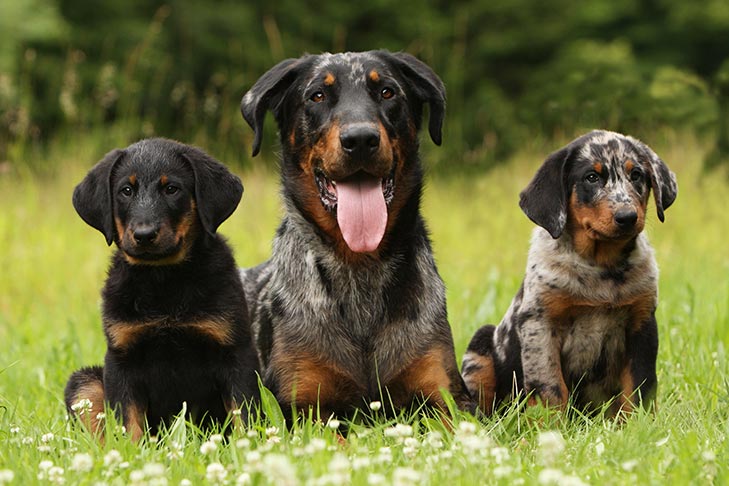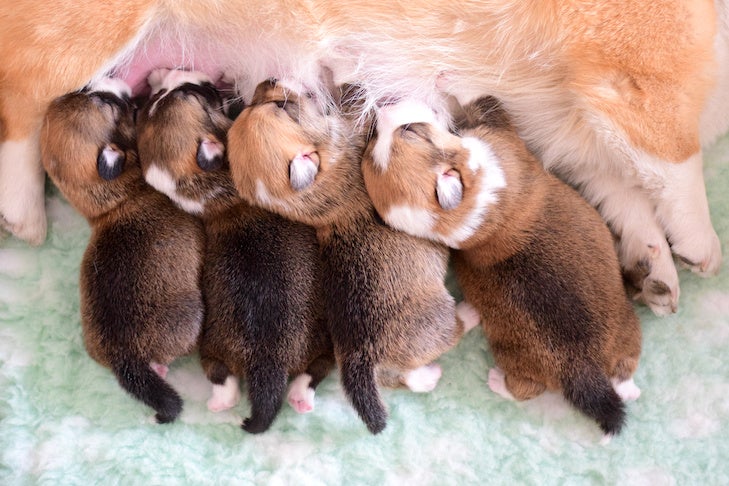
“Female dogs are moodier; males are more playful.” “Females are more dog-aggressive; males are more human-aggressive.” “Males are more loyal.” “Females are sweeter.” Everyone, it seems, has an opinion on sex differences in dogs—these are just a few I collected in an informal poll. But is there any truth to these distinctions, or are they just another way humans perpetuate their own ideas about gender?
Is There Any Evidence That Male and Female Dogs Behave Differently?
Scientists have been trying to fathom, once and for all, whether male and female dogs are truly different, and it’s turned out to be a difficult question. One 2018 review of previous studies found that male and female dogs do behave slightly differently, and that those differences “are mainly rooted in their biological and evolutionary heritage,” meaning they would have begun to develop in the wild. For instance, “aggressiveness and boldness, described as a behavioral syndrome, were reported as being higher in males than females.” Meanwhile, females seemed more interested in “interactions with humans in tasks that require cooperative skills,” whereas “males appeared more inclined to social play.”
However, it’s very difficult to design behavioral experiments that rule out any existing bias—and the science suggests that humans have plenty of bias about dogs’ sexes. A 2011 study, for instance, found that “owners use gender norms to (1) select what they consider to be suitable dogs, (2) describe their dogs’ behaviors and personalities, and (3) use their dogs as props to display their own gender identities.” While humans remain so opinionated about gender distinctions in our own species, it seems unlikely we’ll be able to assess sex differences in other groups with any real degree of accuracy.

Remember that technically, animals do not have “genders.” Gender typically references social and cultural differences rather than biological ones. Dogs are labeled male or female based solely on their sex, which is determined by reproductive anatomy and biological makeup.
A Boy Puppy, a Girl Puppy—or Just the Right Puppy?
Gender bias towards dogs typically comes into play most strongly when people are selecting a new puppy—as breeders can attest. AKC Breeder of Merit Jessica Freni, who breeds English Toy Spaniels, notes that around 70 percent or more of prospective puppy owners come to her with a particular sex of puppy in mind.
But Freni doesn’t place puppies with families based on their sex (or color). Her dogs complete the 12-week Puppy Culture training and socialization program and are comprehensively evaluated at eight weeks. The results of that evaluation are used to place puppies with the best-matched home, based on temperament, lifestyle, and other substantive factors. “Sex is pretty superficial, color is definitely superficial,” Freni told me.” Your dog’s health and temperament and abilities fitting your lifestyle are definitely way more substantial for success than what is biological.”
Siberian Husky breeder Sheila Goffe agrees. “I think a lot of it really comes down to the individual dog,” she told me. “For Siberians, a medium-sized breed, it has a lot more to do, frankly, with how they’re raised, their environment, and their genetics. Like people, they all have their own individual personalities.”
But what about behaviors that are often seen as gendered—for instance, the marking and humping that are often associated with male dogs? “I think a lot of people approach wanting a female as a pet because they have an old bias that males hump and males mark. And that’s simply not true,” says Freni. “These behaviors are training issues, not sex-specific issues … females are just as likely to mark or hump as their male counterparts are. … And as somebody who has multiple intact males of varying ages in my house, I can assure you, we have zero humping and zero marking.”

When Might Sex Be an Important Factor in Choosing a Puppy?
Breeders I consulted noted two contexts when it’s important to consider the sex of your new puppy: when you want to breed (or avoid breeding in a home with other, intact dogs), and when you want to avoid aggression issues in a home with other dogs.
In households with multiple dogs, certain sex combinations might be less likely to spark aggression. Jessica Freni notes: “If I know that the family is considering a second dog in the future, then I tend to steer them towards a male, and either a male-male home, or a male-female home, versus a home with two females, because if there is going to be a conflict, it tends most often to be female-female conflict.” Sheila Goffe adds that often, a male dog and a female dog get along best—though she stresses that again, ultimately, it comes down to the individual dogs.
For owners who want to keep their dogs intact during puppyhood for health reasons but avoid breeding, it can also be important to consider sex—and not just so that you don’t end up with accidental puppies. “If there’s one or more that are intact, that are not spayed or neutered, that can open the door to a whole other series of issues with jealousies, or a girl in season that you have boys fighting over,” Sheila Goffe notes. And Jessica Freni adds: “It’s a lot easier to keep a male intact than it is to have to worry about a female coming into season, with whom you don’t have intentions of breeding.”
Meanwhile, if a new owner is planning to breed their new puppy, there’s a clear incentive to choose based on sex.
But in all other situations, the jury is in: sex is not the most important factor when it comes to finding your next canine family member. “I hate to see families limit themselves in terms of breeders or in terms of dogs,” says Jessica Freni. “The absolute perfect dog for their family may be outside of their requirements.”

